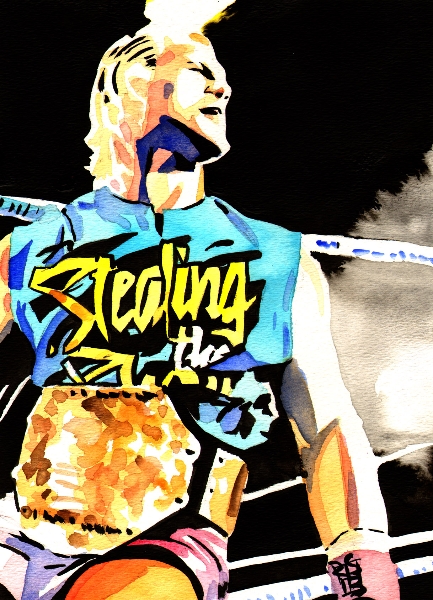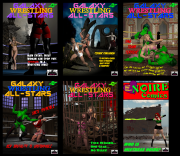Matt Murphy’s Chapter 27 Sharing Knowledge , XXVIII. The Finish and Acknowledgments
Posted by flairwhoooooo on February 1, 2010
Chapter 27: Sharing Knowledge
I loved training wrestlers. To me, developing a wrestler from the infancy stage of his career to success at any level was more rewarding than any of my own in-ring accomplishments. It’s important to know that not every good wrestler makes a good teacher and not mediocre wrestler makes a mediocre teacher.
Look at some of the top trainers around: Larry Sharpe, Les Thatcher, Jesse Hernandez, and Ron Hutchison were never huge stars in the sport. That’s not saying that any one of them was not a good wrestler, but each has created stars bigger than they became themselves.
Training aspiring wrestlers in an awesome responsibility. Every person who steps through the doors of a wrestling school has a dream of wrestling success. The wrestling hopeful is trusting you with his dream. Unfortunately, not everybody is cut out to be a wrestler. You might find yourself in a situation where you’re in need of money and looking at a tryout who has zero chance at being an asset to the business as a wrestler, but he has a pen in-hand and he’s ready to write a check out to you. You have to have enough commitment to the business to turn him away.
Training is something that should be done out of love for the sport and a desire to see it survive by feeding it new, well-trained talent. It takes time, patience, and a genuine investment in the trainee.
I’ll be the first to admit that I was not a veteran when I became the lead instructor at the Harley Race Wrestling Academy. Guided by Harley, I learned with my students, but I took the role seriously, sometimes training nine hours each day: I became, I believe, a very good trainer. The only things I expected from my students were attention, effort, and hunger. I expected their undivided attention while I was speaking, a 100-percent effort every time they came to train, and a hunger to succeed. When I began training students, I remembered everything from my own training and echoed the voice of then-lead instructor, Derek Stone, until I found my own voice.
Confidence is vital to the development of wrestlers. When training students, there is a time and a place to be critical. You can nit-pick anything, but sometimes it’s best to consider the big picture rather than each pixel of the photo. If one of your students has only been wrestling for a few months and you watch him make it through a solid match but could see him stomp on a punch, save that battle for another day. He made it through a solid match, so let him feel good about it. You want your students to be the best they can be, but leave them hungry to learn more, anxious for the next time they have the pleasure of stepping into the ring.
I learned quickly that you can’t deal with everybody the same. Some needed a fire lit under their asses, others needed nurtured like frail baby rabbits. Damn, I really just wrote that. Also, a trainer can’t just teach everybody to work like the trainer works. He has to imagine what he would need to do to get over and do well if he was each individual trainee. A big man needs to be taught differently than a cruiserweight.
Like just about any profession, business and personal relationships must be kept separate. When I began training Derek McQuinn, we quickly became friends. I told him the first time we drank beer together that we could hang out and have all the fun the world had to offer together, but when we were in a wrestling environment, it was business. I had a responsibility to him, to Harley, and to wrestling to train him well, and I couldn’t do that and be his friend when it was time for training.
If you train students, do it for the benefit of the business, not for the money. Your goal should be to produce excellent workers with the tools to survive and succeed in this business.
XXVIII. The Finish
Here are a few more tips before I wrap this up:
•If you get hurt or hurt your opponent frequently, then you are not a good worker.
•Don’t stomp when you punch. People know that fist hitting flesh doesn’t make the same noise that a wrestler being slammed to the mat makes.
•Always be honest with yourself. I’ve seen too many wrestlers who can’t get over themselves long enough to see the things they need to improve upon.
•Spots should be used to help tell your story. Don’t fall in love with a spot and throw off your whole story just to get it in your match. There’s a saying in the writing world that goes “Murder your darlings.” That means that sometimes an author has to cut out words, sentences, paragraphs, pages, often even chapters that he loves the most because, no matter how poetic or witty or profound those words might be, they are self-indulgent and don’t serve the story.
•Always protest a babyface turn that occurs because heels reject you. After Randy Orton won his first World Title, he and Chris Benoit had a very good rematch. His Evolution partners beat down Benoit and celebrated with Orton before attacking him. Orton became a babyface because he was rejected as a heel. Why should fans care about a dickhead who would still be a dickhead if the other dickheads hadn’t turned their backs on him? On the other hand, if Orton would’ve saved Benoit from the beat-down because of his newfound respect for his opponent and for the World Title, that would have been an effective turn. He would’ve turned because he chose to do the right thing, not because the other heels rejected him.
•Professional wrestling is a brotherhood. Look out for one another and always be respectful, considerate, and helpful to others. The camaraderie you’ll experience in the wrestling business is like no other friendship with a large group of people you will ever find, and it’s what many former wrestlers miss the most about the business.
•Learn everything you can about the history of this business. It offers a fascinating history with characters and stories unlike anything else. The person who said, “There’s no business like show business” never met professional wrestling.
•Buy books and audiobooks on goal-setting and achievement. None of that Dr. Phil crap, but books like The Success Principles: How to Get from Where You Are to Where You Want to Be by Jack Canfield provide outstanding guidance. Play the audiobooks during road trips and work commutes and listen to them many times over.
•Learn to work with everyone. The term “he could have a good match with a broomstick” is overused, but the mark of a great worker is the ability to have great matches regardless of the skill level of the opponent.
•Evaluate yourself honestly and set goals. What are your strengths and weaknesses? What do you need to do to be ready if you ever get the call from WWE? Close your eyes and picture the life you want, then write it down. Determine what you will have to make the dream a reality. Set small, attainable goals daily that will feed the monster that is your dream.
You’re ready to become a star. Fame and fortune and ring rats hotter than your high-school prom queen are almost within your reach, right? I wish I could tell you that’s the case, but in reality you’re more likely looking at a few years or more of poverty and hooking up with an ugly girl after shows because she’ll cook you dinner and let you stay at her apartment, since what you’ll lose in pride is less valuable than the cost of a hotel room. I’m not advocating that route, but it’s a road many wrestlers travel.
Never lose sight of your dreams. Chances are, you’re in this business with dreams of going all the way to the top. Work hard every day to move a step closer to making your dream a reality.
Write yourself a note or make a sign that you’ll see every day that reads:
What have I done today to become great?
Acknowledgments
Thanks to everyone who took the time to read this! Please be sure to pass it on or recommend it to a friend, help spread the word in your blogs, on message boards, and by posting a review on Amazon.com
I welcome any feedback. Please send it to: mjhmurphy@gmail.com
Thanks to Missouri Wrestling Revival for hosting my book in blog form and for laboring to better the independent wrestling business.
Thanks to those who offered me guidance during my time in the wrestling business: Derek Stone, Griz, “Tiger” Treach Phillips, Jr., Harley Race, Dave Marquez, Johnny Jett, Drill Instructor, Ace Steel, Skippy Johnson, Ron Harris, Don Harris, Malia Hosaka, Mr. Destiny, T.S. Aggressor, John Cone, Juan Fourneau, Bob Geigel, Larry Matysik, Ian Rotten, Les Thatcher, Danny Hodge, Disco Inferno, Meng, the Barbarian, Bobby Eaton, Butch Reed, Ron Powers, Gary Jackson, Mick Foley, Tony Atlas, “Dr. Death” Steve Williams, Vader, Scorpio, Juventud Guerrera, Michael Modest, Donovan Morgan, Richard Slinger, Honky Tonk Man, Daisuke Ikeda, Takao Omori, Jun Akiyama, Mitsuharu Misawa, Matt Hardy, Tony Garea, John Laurinitis, Kevin Kelly, Jon Weiner, Brian Gewirtz, Naomichi Marufuji, Shane Hooker, Dorty Reid, James Wells, Shannon Moore, Chris Cruise, and many others.
Many thanks and much respect to the fans, especially independent wrestling fans.
Be sure to check out my first book, available at Amazon.com: The Story of a Nobody and the Pursuit to Become a Somebody










Leave a comment